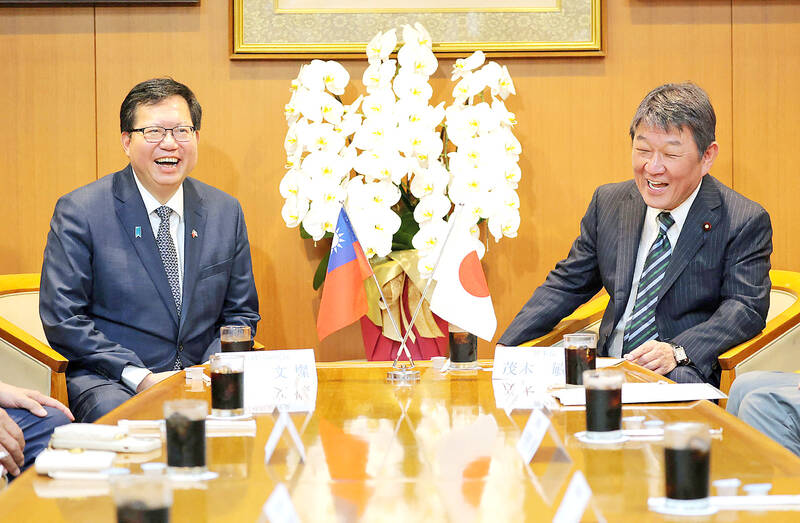Vice Premier Cheng Wen-tsan (鄭文燦) yesterday paid a visit to Toshimitsu Motegi, secretary-general of Japan’s ruling Liberal Democratic Party, at the party’s headquarters in Tokyo.
Speaking during the meeting, Motegi said Taiwan is an extremely important partner to Japan and a precious friend with shared values such as freedom, democracy, human rights and the rule of law, adding that the two countries have close economic relationships and regular personnel exchanges.
Motegi said while he was serving as Japan’s foreign minister in 2021, the COVID-19 pandemic was bringing suffering to people all over the world, and that he is still grateful to Taiwan for its donation of 2 million masks and various medical resources to Japan at that time.

Photo: AFP
Japan also donated around 4.2 million doses of COVID- 19 vaccines to Taiwan, he said, adding that around the same time he also received a warm letter from Cheng expressing his hope that the Japanese people were managing to cope with the challenging situation.
Cheng expressed gratitude to Japan for its donation of the 4.2 million vaccine doses, pointing out that the figure accounts for about 20 percent of Taiwan’s population.
Cheng added that Taiwan and Japan have shared values and extremely close trade ties, and also face common geopolitical challenges.
Most importantly, the two countries have a shared vision, he said, saying that at the recently concluded G7 summit in Hiroshima, the world’s wealthiest democracies laid out a strategy of "de-risking, not de-coupling" from China.
"De-risking" refers to reducing reliance on China’s supply chains, without completely isolating it.
Yesterday afternoon, Cheng also visited contract chipmaker Taiwan Semiconductor Manufacturing Co’s 3DIC R&D Center in Tsukuba, Ibaraki Prefecture.
Cheng is currently leading a delegation of economics officials on a visit to Tokyo from Monday till today to conduct exchanges in energy, net-zero emissions and fifth generation wireless cellular technology.

The High Prosecutors’ Office yesterday withdrew an appeal against the acquittal of a former bank manager 22 years after his death, marking Taiwan’s first instance of prosecutors rendering posthumous justice to a wrongfully convicted defendant. Chu Ching-en (諸慶恩) — formerly a manager at the Taipei branch of BNP Paribas — was in 1999 accused by Weng Mao-chung (翁茂鍾), then-president of Chia Her Industrial Co, of forging a request for a fixed deposit of US$10 million by I-Hwa Industrial Co, a subsidiary of Chia Her, which was used as collateral. Chu was ruled not guilty in the first trial, but was found guilty

DEADLOCK: As the commission is unable to forum a quorum to review license renewal applications, the channel operators are not at fault and can air past their license date The National Communications Commission (NCC) yesterday said that the Public Television Service (PTS) and 36 other television and radio broadcasters could continue airing, despite the commission’s inability to meet a quorum to review their license renewal applications. The licenses of PTS and the other channels are set to expire between this month and June. The National Communications Commission Organization Act (國家通訊傳播委員會組織法) stipulates that the commission must meet the mandated quorum of four to hold a valid meeting. The seven-member commission currently has only three commissioners. “We have informed the channel operators of the progress we have made in reviewing their license renewal applications, and

Taiwan People’s Party (TPP) Chairman Huang Kuo-chang (黃國昌) yesterday appealed to the authorities to release former Taipei mayor Ko Wen-je (柯文哲) from pretrial detention amid conflicting reports about his health. The TPP at a news conference on Thursday said that Ko should be released to a hospital for treatment, adding that he has blood in his urine and had spells of pain and nausea followed by vomiting over the past three months. Hsieh Yen-yau (謝炎堯), a retired professor of internal medicine and Ko’s former teacher, said that Ko’s symptoms aligned with gallstones, kidney inflammation and potentially dangerous heart conditions. Ko, charged with

Taiwan-based publisher Li Yanhe (李延賀) has been sentenced to three years in prison, fined 50,000 yuan (US$6,890) in personal assets and deprived political rights for one year for “inciting secession” in China, China's Taiwan Affairs Office spokesman Chen Binhua (陳斌華) said today. The Shanghai First Intermediate People’s Court announced the verdict on Feb. 17, Chen said. The trial was conducted lawfully, and in an open and fair manner, he said, adding that the verdict has since come into legal effect. The defendant reportedly admitted guilt and would appeal within the statutory appeal period, he said, adding that the defendant and his family have